Even during this time of social-distancing, Irish coffee companies are freshly roasting their beans and will courier them – and coffee-making accessories – straight to your door. If you love coffee and always wanted to know how best to brew at home; now’s a great time to virtually explore the world of Irish coffee.
Red Rooster Coffee, Sligo
When William Davenport and his family moved to Ireland from their native Houston, Texas, 10 years ago, roasting coffee for a living wasn’t really on their radar.
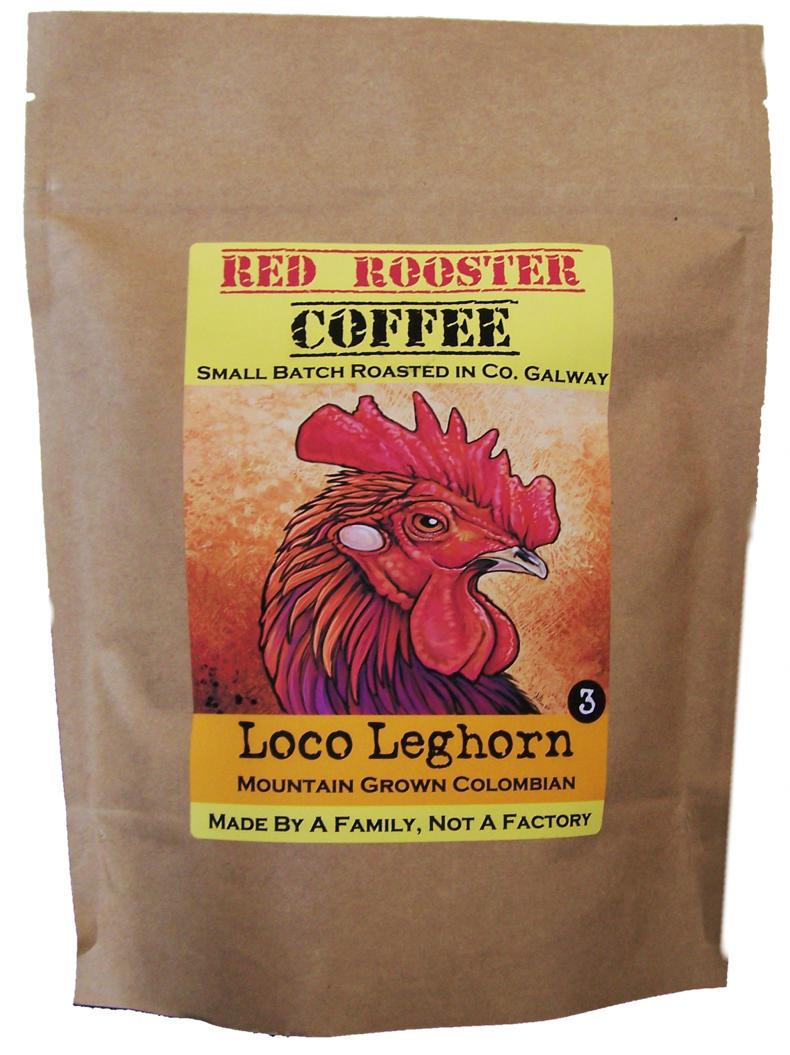
“We came here looking for a change of pace,” he says. “We did a three-month house sit and ended up staying. Sligo is gorgeous – when it’s not raining.”
William was working remotely in housing industry sales when the recession started. When his company was sold and the sales team made redundant, he was concerned about their future.
However, his children loved Ireland and wanted to stay, and his wife had an interesting idea.
“She said, ‘You know, I’ve always want to roast coffee’”, William recalls. “Everyone thought we were crazy. And, really, we thought we were too.”
Though the Davenports knew next to nothing about roasting coffee, that didn’t stop them from purchasing a cast-iron roaster in late 2011. There are few other roasters like it in Ireland. Many today are completely digitised, taking a lot of the guesswork out of roasting coffee beans. 
The Davenports’ approach to coffee has always been to take it slow, which is what having a cast-iron roaster does.
“Having grown up with parents who used cast-iron skillets (which last forever and are more non-stick than a Teflon pan), we love that even, warm heat for our beans,” William says. “Other roasters can get hot spots that can scorch the coffee. We’re all about flavour, freshness and slow roasting. I guess we’re part of the slow food movement.”
By slow roasting on cast iron, William feels the natural sugars in the coffee beans are feels the natural sugars in the coffee beans are released slowly; resulting in a rich, caramelised flavour and well-balanced body.
You can get Red Rooster Coffee
delivered right to your door if you order by email (info@davenportcoffee.com)
or check their website
www.davenportcoffee.com to see
if they have a stockist near you.

Red Rooster Coffee Range
Featuring on the menus of some of Cork’s best eateries, West Cork Coffee started out as a passion project for owner and head roaster Tony Speight.
“I started roasting coffee in Australia in 2004,” he says. “I was doing a year of travelling and I applied for a job as a barista in Melbourne – I had zero experience, I just kind of progressed into the roastery.”
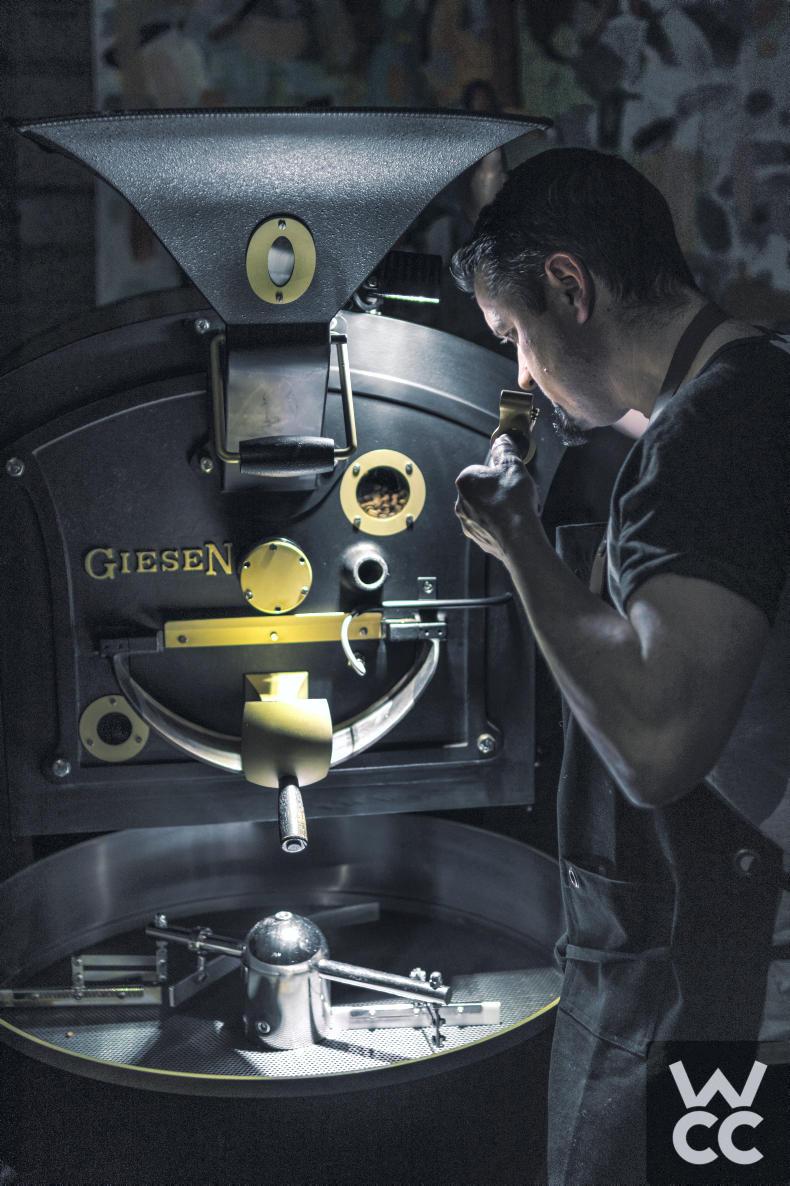
Tony Speight of West Cork Coffee.
Upon his return to Ireland, Tony – who’s background is in electrical engineering – built himself a coffee roaster and started importing coffee beans so he could roast for himself, family and friends, just as a hobby. When his friend Diana Dodog won Masterchef and opened a food truck in west Cork, she asked him to start supplying coffee for her business and that, he says, was the beginning of West Cork Coffee.
“It’s just progressed from there,” he says. “I gave up the pensionable job and started roasting coffee beans.”
Because he mainly roasts directly for chefs and cafe owners, Tony has to be extra careful about how he sources his coffee beans. He is constantly on the move, looking for the best harvests from around the world and he says this can change year on year.
“I’d be looking for coffee offerings from different countries. We only use single-origin coffee because, as food traceability becomes more important to people, it’s good to know your beans are only coming from one estate. We track the harvests and see what’s available; what’s fresh and then we try to secure it for our clients. It’s an ongoing process.
“At the moment I’m a big fan of Bolivian coffee, but in previous years Honduras was producing really good beans,” he continues.
“It’s all a matter of staying on top of things. We work with a high-end clientele – they’re looking for special coffees and it’s our job to find them something that stands out.”
Tony would like people to start treating coffee in a similar way to wine – for him; there’s so much more to a good cup of coffee than a hit of caffeine.
“We have a popular subscription service [online],” he says. “We offer subscribers a different coffee every month and sometimes [the coffees are] exclusively sourced for members and roasted in small batches. They get delivered the first Monday of every month.”
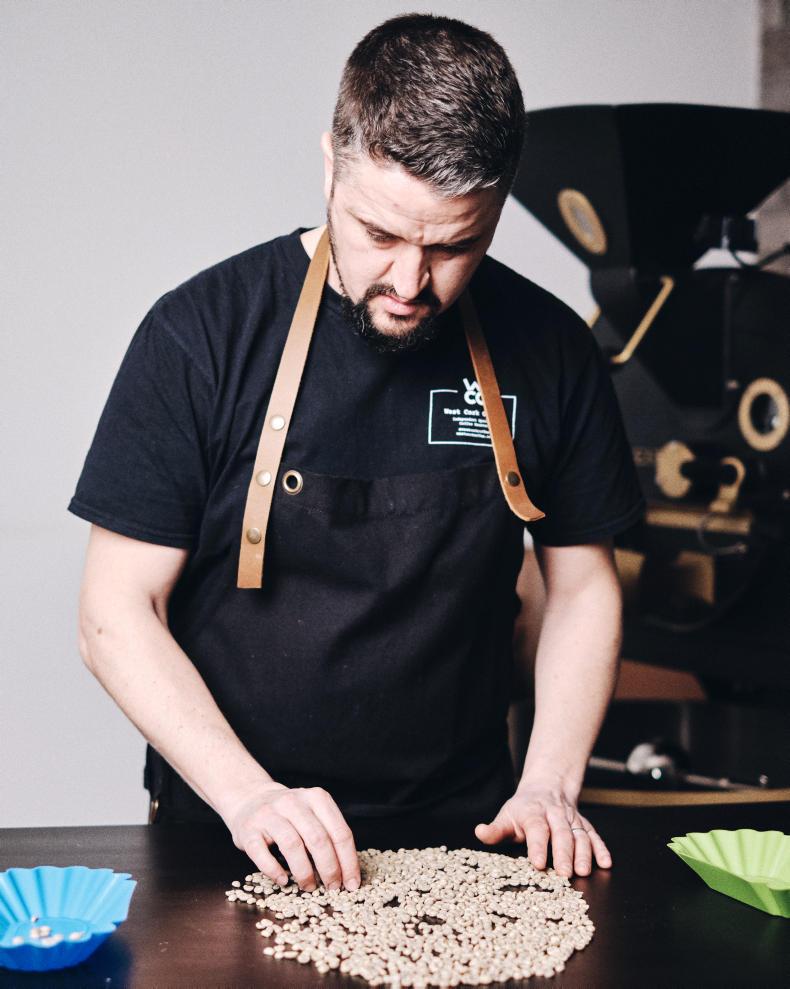
Tom Speight of West Cork Coffee.
To learn more about Tony’s coffee or to purchase beans and equipment, visit https://www.westcorkcoffee.ie/
Alan Andrews believes coffee should be an experience. At least, that was part of the plan when he first opened The Old Barracks Roastery and Coffee Bar in Birdhill, Co Tipperary.
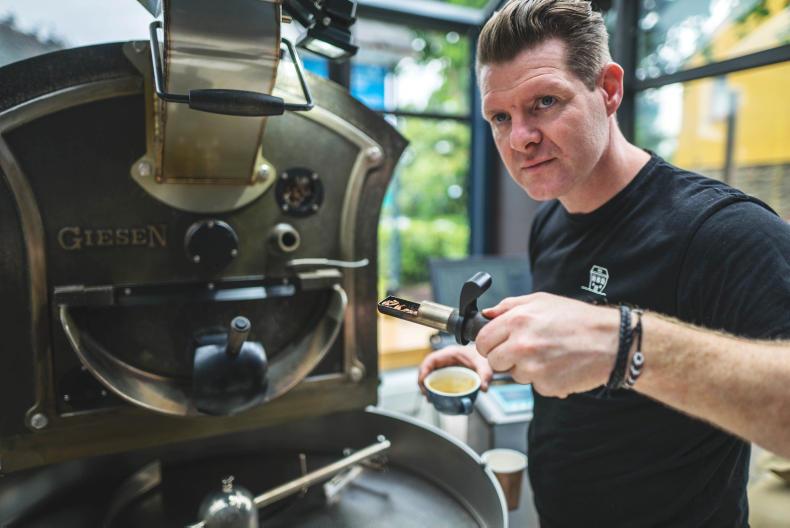
Alan Andrews roasts coffee beans at The Old Barracks
“Prior to 2009, I had a small chain of coffee shops in Limerick and I just felt we weren’t making great coffee,” he says. “I wanted a career where I had flexibility, time for my kids and so I really felt I should go in the direction of coffee training and education and consulting.”
With an eye for roasting coffee for wholesale and giving coffee courses, Alan acquired the building in Birdhill and began fixing it up to suit the business. Originally working with a roasting partner, as Alan began teaching more courses, he knew he had to be the one roasting the beans in order to be able to explain any differences in flavour or inconsistencies to his clients.
“The market was moving and the customers wanted more – they wanted specialty beans, they were asking about beans from different countries,” he explains. “I was [the one] training and so I was getting the pulse of what was going on and what people wanted. I 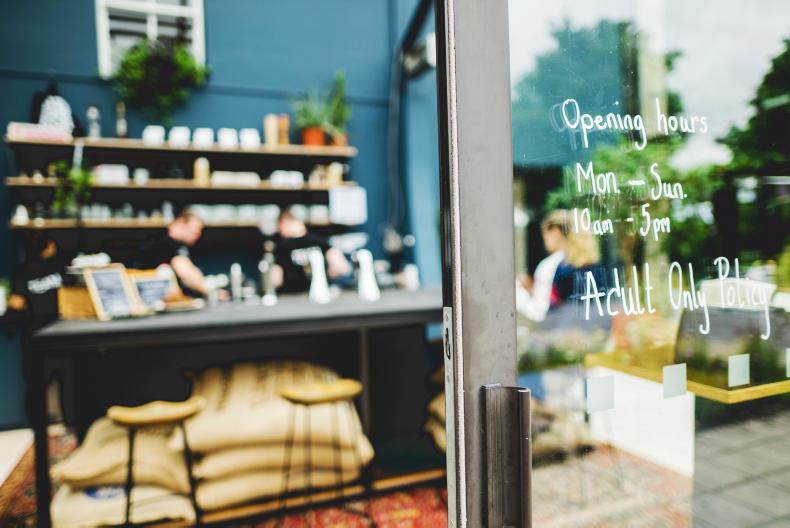
started tasting inconsistencies and was trying to train people on coffee someone else had roasted.”
Alan bought their roaster in 2017 and has been roasting their own beans since early 2018. He added in a cafe, thinking it probably wouldn’t attract that many, but has been astonished at how busy The Old Barracks has become with people looking for a good cup of coffee. His plan of making The Old Barracks an experiential destination for the coffee curious has worked.
“I was never trying to attract loads of retail customers so I never worried about opening in a rural area,” he laughs. “Keep your expectations low and your standards high, right? But the customers just keep coming. Things have to be experiential. That’s what people come for. If we were ever going to do something here we needed to leverage that concept.”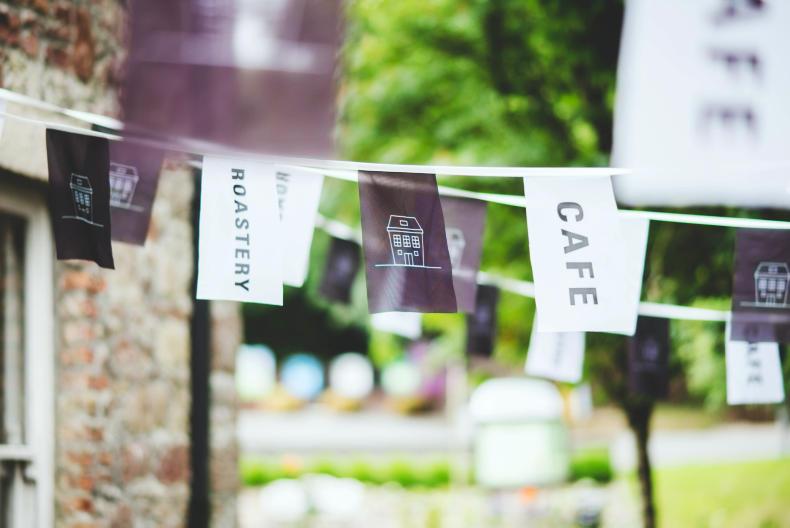
The Old Barracks
Alan has been lauded for his state-of-the-art coffee equipment, which, by digitising the coffee-making process has led to being able to provide incredibly accurate shots of espresso for their clientele. They use Modbar technology, which is (at the time of writing) the only model you’ll find in Ireland.
Completely unlike a traditional espresso machine, the Modbar set-up is more like a beer keg, with water storage beneath and space-age looking spouts on top. Each cup of coffee is brewed by weight and the weight and grind setting for each cup changes according to the weather. Alan’s innovative approach to coffee recently won the business a Tipperary Enterprise Award.

Coffee at the Old Barracks.
You can purchase coffee and coffee
accessories online at www.theoldbarracks.ie
Brew the perfect cup at home
These coffee roasters may be at the top of their game, but what good is it buying their coffee beans if you aren’t sure how to brew?
Alan Andrews of The Old Barracks says there’s no reason why anyone can’t brew the same level of quality at home as they can get in the cafe.
“When people buy a new coffee accessory, we give them the ‘cheat sheet’,” he says. “Sometimes we get people here who like coffee and want to upgrade their own domestic coffee experience. They might have some beans or a new coffee maker but they don’t know how to extract flavour from those things.”
Luckily, most coffee accessories on the market today (unlike Alan’s space-age Modbar espresso machine) are extremely user-friendly. It can be daunting, especially if you’re new to coffee drinking, when it comes to finding the right accessory for your home.
Here are two popular options that won’t break the bank and are really easy to use:

French press: this coffee maker (left) usually comes in a 1L size or smaller. It’s perfect for a household with one or two coffee drinkers. To use, simply remove the plunger, add coarsely ground coffee (18g of coffee per 280ml of boiled water), pour the water over the grounds, stir and then put the plunger top back on (but do not plunge). Allow the water and ground coffee to soak for four minutes, then put the plunger down to hold the grounds to the bottom.
Clever dripper: this is a great coffee maker for someone who is just making the switch over from instant coffee. The clever dripper often fits right over your mug. You just line the clever dripper with a paper filter, add finely ground coffee (18g per 330ml of water) and pour freshly boiled water over top. The coffee slowly filters right into your cup or pot, ready to drink in no time.
Even during this time of social-distancing, Irish coffee companies are freshly roasting their beans and will courier them – and coffee-making accessories – straight to your door. If you love coffee and always wanted to know how best to brew at home; now’s a great time to virtually explore the world of Irish coffee.
Red Rooster Coffee, Sligo
When William Davenport and his family moved to Ireland from their native Houston, Texas, 10 years ago, roasting coffee for a living wasn’t really on their radar.

“We came here looking for a change of pace,” he says. “We did a three-month house sit and ended up staying. Sligo is gorgeous – when it’s not raining.”
William was working remotely in housing industry sales when the recession started. When his company was sold and the sales team made redundant, he was concerned about their future.
However, his children loved Ireland and wanted to stay, and his wife had an interesting idea.
“She said, ‘You know, I’ve always want to roast coffee’”, William recalls. “Everyone thought we were crazy. And, really, we thought we were too.”
Though the Davenports knew next to nothing about roasting coffee, that didn’t stop them from purchasing a cast-iron roaster in late 2011. There are few other roasters like it in Ireland. Many today are completely digitised, taking a lot of the guesswork out of roasting coffee beans. 
The Davenports’ approach to coffee has always been to take it slow, which is what having a cast-iron roaster does.
“Having grown up with parents who used cast-iron skillets (which last forever and are more non-stick than a Teflon pan), we love that even, warm heat for our beans,” William says. “Other roasters can get hot spots that can scorch the coffee. We’re all about flavour, freshness and slow roasting. I guess we’re part of the slow food movement.”
By slow roasting on cast iron, William feels the natural sugars in the coffee beans are feels the natural sugars in the coffee beans are released slowly; resulting in a rich, caramelised flavour and well-balanced body.
You can get Red Rooster Coffee
delivered right to your door if you order by email (info@davenportcoffee.com)
or check their website
www.davenportcoffee.com to see
if they have a stockist near you.

Red Rooster Coffee Range
Featuring on the menus of some of Cork’s best eateries, West Cork Coffee started out as a passion project for owner and head roaster Tony Speight.
“I started roasting coffee in Australia in 2004,” he says. “I was doing a year of travelling and I applied for a job as a barista in Melbourne – I had zero experience, I just kind of progressed into the roastery.”

Tony Speight of West Cork Coffee.
Upon his return to Ireland, Tony – who’s background is in electrical engineering – built himself a coffee roaster and started importing coffee beans so he could roast for himself, family and friends, just as a hobby. When his friend Diana Dodog won Masterchef and opened a food truck in west Cork, she asked him to start supplying coffee for her business and that, he says, was the beginning of West Cork Coffee.
“It’s just progressed from there,” he says. “I gave up the pensionable job and started roasting coffee beans.”
Because he mainly roasts directly for chefs and cafe owners, Tony has to be extra careful about how he sources his coffee beans. He is constantly on the move, looking for the best harvests from around the world and he says this can change year on year.
“I’d be looking for coffee offerings from different countries. We only use single-origin coffee because, as food traceability becomes more important to people, it’s good to know your beans are only coming from one estate. We track the harvests and see what’s available; what’s fresh and then we try to secure it for our clients. It’s an ongoing process.
“At the moment I’m a big fan of Bolivian coffee, but in previous years Honduras was producing really good beans,” he continues.
“It’s all a matter of staying on top of things. We work with a high-end clientele – they’re looking for special coffees and it’s our job to find them something that stands out.”
Tony would like people to start treating coffee in a similar way to wine – for him; there’s so much more to a good cup of coffee than a hit of caffeine.
“We have a popular subscription service [online],” he says. “We offer subscribers a different coffee every month and sometimes [the coffees are] exclusively sourced for members and roasted in small batches. They get delivered the first Monday of every month.”

Tom Speight of West Cork Coffee.
To learn more about Tony’s coffee or to purchase beans and equipment, visit https://www.westcorkcoffee.ie/
Alan Andrews believes coffee should be an experience. At least, that was part of the plan when he first opened The Old Barracks Roastery and Coffee Bar in Birdhill, Co Tipperary.

Alan Andrews roasts coffee beans at The Old Barracks
“Prior to 2009, I had a small chain of coffee shops in Limerick and I just felt we weren’t making great coffee,” he says. “I wanted a career where I had flexibility, time for my kids and so I really felt I should go in the direction of coffee training and education and consulting.”
With an eye for roasting coffee for wholesale and giving coffee courses, Alan acquired the building in Birdhill and began fixing it up to suit the business. Originally working with a roasting partner, as Alan began teaching more courses, he knew he had to be the one roasting the beans in order to be able to explain any differences in flavour or inconsistencies to his clients.
“The market was moving and the customers wanted more – they wanted specialty beans, they were asking about beans from different countries,” he explains. “I was [the one] training and so I was getting the pulse of what was going on and what people wanted. I 
started tasting inconsistencies and was trying to train people on coffee someone else had roasted.”
Alan bought their roaster in 2017 and has been roasting their own beans since early 2018. He added in a cafe, thinking it probably wouldn’t attract that many, but has been astonished at how busy The Old Barracks has become with people looking for a good cup of coffee. His plan of making The Old Barracks an experiential destination for the coffee curious has worked.
“I was never trying to attract loads of retail customers so I never worried about opening in a rural area,” he laughs. “Keep your expectations low and your standards high, right? But the customers just keep coming. Things have to be experiential. That’s what people come for. If we were ever going to do something here we needed to leverage that concept.”
The Old Barracks
Alan has been lauded for his state-of-the-art coffee equipment, which, by digitising the coffee-making process has led to being able to provide incredibly accurate shots of espresso for their clientele. They use Modbar technology, which is (at the time of writing) the only model you’ll find in Ireland.
Completely unlike a traditional espresso machine, the Modbar set-up is more like a beer keg, with water storage beneath and space-age looking spouts on top. Each cup of coffee is brewed by weight and the weight and grind setting for each cup changes according to the weather. Alan’s innovative approach to coffee recently won the business a Tipperary Enterprise Award.

Coffee at the Old Barracks.
You can purchase coffee and coffee
accessories online at www.theoldbarracks.ie
Brew the perfect cup at home
These coffee roasters may be at the top of their game, but what good is it buying their coffee beans if you aren’t sure how to brew?
Alan Andrews of The Old Barracks says there’s no reason why anyone can’t brew the same level of quality at home as they can get in the cafe.
“When people buy a new coffee accessory, we give them the ‘cheat sheet’,” he says. “Sometimes we get people here who like coffee and want to upgrade their own domestic coffee experience. They might have some beans or a new coffee maker but they don’t know how to extract flavour from those things.”
Luckily, most coffee accessories on the market today (unlike Alan’s space-age Modbar espresso machine) are extremely user-friendly. It can be daunting, especially if you’re new to coffee drinking, when it comes to finding the right accessory for your home.
Here are two popular options that won’t break the bank and are really easy to use:

French press: this coffee maker (left) usually comes in a 1L size or smaller. It’s perfect for a household with one or two coffee drinkers. To use, simply remove the plunger, add coarsely ground coffee (18g of coffee per 280ml of boiled water), pour the water over the grounds, stir and then put the plunger top back on (but do not plunge). Allow the water and ground coffee to soak for four minutes, then put the plunger down to hold the grounds to the bottom.
Clever dripper: this is a great coffee maker for someone who is just making the switch over from instant coffee. The clever dripper often fits right over your mug. You just line the clever dripper with a paper filter, add finely ground coffee (18g per 330ml of water) and pour freshly boiled water over top. The coffee slowly filters right into your cup or pot, ready to drink in no time.















SHARING OPTIONS